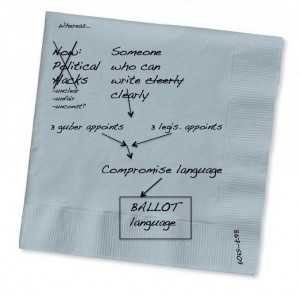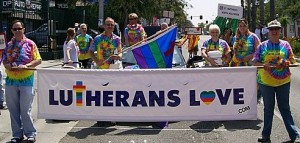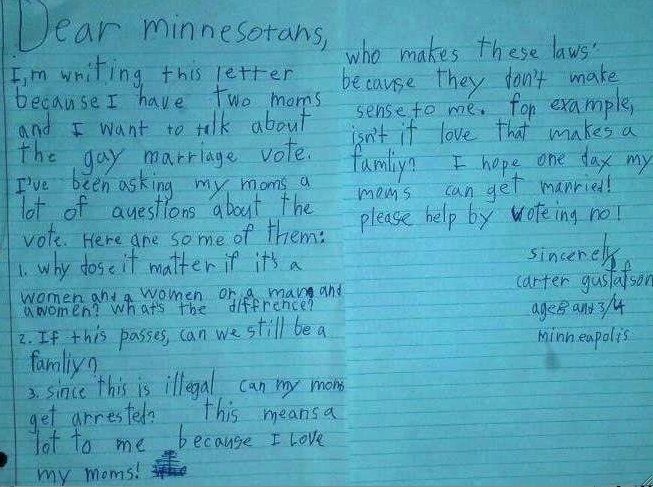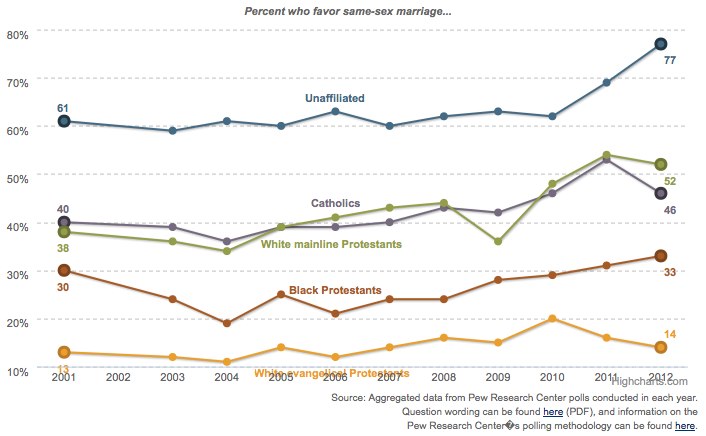Tag Archives: marriage ban amendment
Anti-Marriage Ban Ads Are Rove-esque
 Bare knuckles political consultant Karl Rove was famous for advising former President George W. Bush and other conservative clients to attack their opponents’ strengths, rather than their weaknesses. For instance, Bush’s 2004 opponent John Kerry was a war veteran and hero, while Bush got a draft deferment. But before Rove was done, Kerry’s heroism somehow was twisted to be a political weakness, rather than the strength it should have been.
Bare knuckles political consultant Karl Rove was famous for advising former President George W. Bush and other conservative clients to attack their opponents’ strengths, rather than their weaknesses. For instance, Bush’s 2004 opponent John Kerry was a war veteran and hero, while Bush got a draft deferment. But before Rove was done, Kerry’s heroism somehow was twisted to be a political weakness, rather than the strength it should have been.
Fortunately, gay marriage supporters have taken Rove’s strategy to heart, and this time are using the power of the strategy for good instead of evil. Two ads they recently released go directly at the strengths of the groups trying to ban the freedom to marry – the skepticism of the elderly and aggressive opposition of some religious leaders.
These ads counter the conventional wisdom that religious leaders and seniors are universally opposed to gay marriage. It frames the issue as a referendum on love, individual freedom and religious freedom. It shows that skeptics’ opinions are evolving, and that even historic opponents are seeing the issue in a new light.
These are outstanding ads, alternatively moving, funny and thought-provoking. And again, they go directly at the strengths of the marriage banners. If he could manage to get over his anti-gay bigotry, Karl Rove would approve.
– Loveland
A Better Way to Write Minnesota’s Ballot Questions?
Frankly, I don’t know what to make of the debate over the wording of Constitutional Amemdment summaries appearing on Minnesota ballots. Secretary of State Ritchie’s wording seems significantly more clear and descriptive of the actual amendment content. But I’m not sure if a Secretary of State has authority to change the language that the Legislature passes. Soon, the Minnesota Supremes will clarity that question.
But regardless of what the justices say about authority, I wonder if there is a better way to draft clear and accurate ballot language in the future?
 I have a rough idea that I recently developed over a few adult beverages. What, you think the Founding Dads didn’t scribble on the occasional ale house napkin?
I have a rough idea that I recently developed over a few adult beverages. What, you think the Founding Dads didn’t scribble on the occasional ale house napkin?
Anyway, here is my idea: The Legislature and Governor could pass a statute to create a “Ballot Initiative Commission,” or some such proper sounding name. The Commission’s job would be to develop the wording of ballot summaries, which means neither the Legislature nor the Secretary of State would have drafting authority in the future.
Sample Commission details: The Governor could appoint three members, and legislative leaders could appoint three members. None of the members could be current elected officials or government employees, or have served as an elected official or government employee for the past 10 years.
To help get the focus on clarity, the first draft of the ballot language would be developed by whoever is the current head of the University of Minnesota’s Department of English. The English Department Chair’s role would be advisory only.
The Commission could alter the draft however it collectively wanted. There would need to be a majority vote of the Commission supporting the final wording before the language would be conveyed to the Secretary of State for inclusion on the ballot. There would be deadlines to ensure they got their work done in a timely fashion.
The Commission’s wording obviously could still be challenged in the courts, as is happening now with the status quo system. But the big change would be that the language would originate from this less partisan Commission that is structurally required to compromise, not elected officials in either the Legislature or the Secretary of State’s office, or their staffs.
I don’t feel especially strongly about the details of the proposal. The pointy-heads at the Capitol can add all the “whereases,” “in lieu ofs” and “heretofores” they want. The underlying principles are what matter:
REDUCE THE POLITICIZATION OF THE DRAFTING PROCESS. Get ballot language drafting out of the hands of elected officials, who will always be tempted to be more concerned about partisan advantage than clarity or accuracy. Instead, get the drafting into the hands of less partisan Minnesotans.
BAKE THE NEED FOR BIPARTISAN COMPROMISE INTO THE PROCESS. Numerically speaking, structure the Commission so that the Legislature’s appointees can’t attain a majority without winning over at least one vote from a gubernatorial appointee, or vice versa.
PUT MORE INITIAL FOCUS ON CLARITY. At least begin the process with a writer who is paid to be clear, not a writer who is paid to win elections.
A perfect process? Of course, not. Games would still be played. But it would be much better than the current process that is currently in the throes of a messy food fight in the State Supreme Court.
Anyway, if anyone out there is interested, I think I still have the napkin.
– Loveland
This post was also featured as a “best of the best” on MinnPost’s Blog Cabin feature.
Will Changes Among Religious Minnesotans Make the Difference In Minnesota’s Gay Marriage Vote?
 One politically interesting aspect of the marriage ban amendment on Minnesota’s ballot this November is the potential Lutheran Effect.
One politically interesting aspect of the marriage ban amendment on Minnesota’s ballot this November is the potential Lutheran Effect.
Even if we didn’t have Garrison Keillor to constantly remind us, it’s no secret that Minnesota has a lot of Lutherans. Wikipedia tells me that something like a million Minnesotans are Lutheran (24% of the state), with 81% of Minnesota worshiping under the banner of the Evangelical Lutheran Church of America (ELCA), which is much more progressive than the Missouri Synod brand of Lutherans.
In fact, Minnesota has one of the highest percentages of Lutherans of any state in the nation. The religious landscape in Minnesota is vastly different than it is in, say, North Carolina, which recently was the latest in a long line of states to pass a marriage ban amendment. Luternans are 24% of the population in Minnesota, but just 2% in North Carolina.
All of this raises the question: What impact will Minnesota’s Lutheran-heavy religious landscape have on the marriage ban amendment Republicans have put on Minnesota’s November ballot.
Relatively speaking, the Lutherans are progressive on the issue of gay rights. Four synods of the local ELCA-ers recently formally opposed the Minnesota marriage ban amendment pushed by Minnesota’s social conservatives, and I don’t think the votes were close.
Lutheranophile Garrison Keillor observes:
“Lutherans…are the sort of people you could call up when you’re in deep distress. If you’re dying, they’ll comfort you. If you’re lonely, they’ll talk to you. And if you’re hungry, they’ll give you tuna salad.”
And if you’re discriminated against?
This charitable attitude looks to be even stronger among young Lutherans. For instance, a popular song among Lutheran youth, “Party in the ELCA” (a parody of Miley Cyrus’s “Party in the USA”) has the following lyrics:
“We’re coming as we are (sinners and saints),
Doesn’t matter if you’re straight or gay.
YEAH! It’s a party in the ELCA! ”
“Doesn’t matter if you’re straight or gay,” indeed. This “Party in the ELCA” is not exactly the type of religious party the Minnesota Republican Party is hoping for on Election Day 2012.
And it’s not just the Lutheran Effect. It’s now also the Methodist Effect. Over the weekend, the Methodists just took basically the same position as the ELCA. Methodists make up another 4% of Minnesotans, making them the fourth largest denomination in Minnesota, just behind the Baptists at 5%.
And what about Catholics, who are almost tied with Lutherans as the top religion in Minnesota, claiming 25% of the population? Can we presume that Minnesota Catholics want to ban gay marriage?
Yes, but it’s not as overwhelming as some might think. If Minnesota Catholics are anything like national Catholics, 46% of national Catholics support gay marriage, rapidly trending upwards from 40% in 2007.
Hmmm, the times are changing for Catholics too? “Doesn’t matter if your straight or gay? It’s a party in the Opus Dei?”
Many Minnesota social conservatives seem to make the mistake of assuming that the marriage ban amendment debate is a strictly battle of the religious versus the irreligious, and that they will therefore easily win because the irreligious are so few (14% in Minnesota).
But increasingly, religious Minnesotans – looking to the empathetic teachings of the Golden Rule and the tolerance teachings of the Sermon on the Mount – are opposing gay bashing schemes like the proposed marriage ban amendment.
– Loveland
Note: This post also was featured as a “best of the best” on Minnpost’s Blog Cabin feature.


